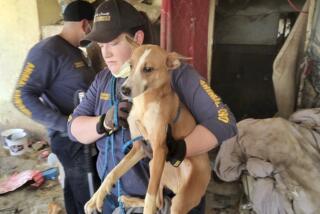Ojai woman held in felony elder abuse and misdemeanor animal abuse case
- Share via
When authorities arrived at the two-bedroom home in Ojai last week, they could smell the urine from 20 feet away.
Upon entering, they found four adults living in unimaginable filth, sharing the home with 12 dogs, two caged rabbits, two cats and one caged African grey parrot.
The residents were also trying to keep wild rats as pets, which quickly got out of hand. Authorities found 55 rats living in cages, and estimated between 200 and 700 wild rats were living throughout the home.
One of the residents, Catherine Ann Vandermaesen, 65, was arrested on suspicion of felony elder abuse and misdemeanor animal abuse.
Prompted by a call from Ventura County Adult Protective Services, sheriff’s deputies tried to make contact with Vandermaesen last Wednesday to check on her 96-year-old father.
But Vandermaesen and her 74-year-old sister, whom authorities believe is a possible victim, refused to allow the deputies inside the home, insisting everyone was fine. The women offered to bring their father outside in a wheelchair. The deputies chose to gather staff members from other agencies and return the following day.
The deputies returned Thursday with Ojai city staff and employees from the county’s adult protective services, code compliance and animal control, along with staff from the Humane Society of Ventura County.
Officials determined that Vandermaesen had allowed her father to live in conditions not fit for human living. Because of the excessive animal filth, animal control officers and humane society staff removed the majority of the animals, allowing one resident to leave with his four dogs. They couldn’t find one of the cats.
The house was yellow-tagged, meaning access is restricted and no one can live there for the time being.
This was not the first time authorities have made contact with the family, said Det. Joseph Preciado of the Ventura County Sheriff’s Office.
“When you continue to see a pattern like that, and all these different resources are getting involved to try to mediate as best they can, and the person just still chooses not to [get help], then you end up with where we were at,” he said. “It could have been non-criminal if they would have actually taken the help from last time and continued on a healthy living course.”
Preciado said mental illness was also a probable factor.
The home had a well-kept backyard, Preciado said, but the residents didn’t allow their dogs, which were medium- to large-sized, outside. Three of the home’s occupants slept in the living room with the 12 dogs.
“I guess probably the best way to say it is, it was almost like a hoarding of animals,” Preciado said.
More to Read
Sign up for Essential California
The most important California stories and recommendations in your inbox every morning.
You may occasionally receive promotional content from the Los Angeles Times.














